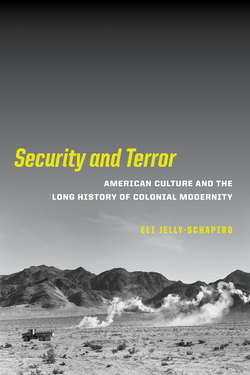Security and Terror

Реклама. ООО «ЛитРес», ИНН: 7719571260.
Оглавление
Eli Jelly-Schapiro. Security and Terror
Отрывок из книги
Security and Terror
AMERICAN CULTURE AND THE LONG HISTORY OF COLONIAL MODERNITY
.....
Both the potentialities and pitfalls of literary witness are confronted with a particular urgency by the writer whose work I examine in chapter 5, Roberto Bolaño. In accord with the fictions of Cole, Hamid, and Díaz, Bolaño’s work—which was ecstatically received across the Anglophone world upon its translation, beginning in 2003—defies the trope of rupture.28 Bolaño’s counterpoint to the historical myopia of the “post-9/11” lens, though, is found in his rendering of another epochal September 11—September 11, 1973, the date on which a military coup overthrew the elected president of Chile, Salvador Allende, and installed in his place the rightist dictatorship of Augusto Pinochet. Using September 11, 1973—in conjunction with an allied moment of rightist reaction, the brutal state response to student demonstrators in Mexico City in 1968—as a prism that refracts the planetary history of modernity, novels such as Amulet (1999) and The Savage Detectives (1998) imagine the space of ostensive rupture not as a wall that blocks off the past and the world but as an opening that brings deeper histories into view. Confined to a bathroom stall during the army’s occupation of the National Autonomous University of Mexico (UNAM), accompanied only by a book of poems, the narrator of Amulet, Auxilio, perceives the imbrication of past, present, and future. “The year 1968 became the year 1964 and the year 1960 became the year 1956. But it also became the years 1970 and 1973 and the years 1975 and 1976.”29 In The Savage Detectives this trans-temporal recognition is joined to a de-territorial consciousness and desire; Arturo Belano (Bolaño’s fictional alter ego) and his comrades move from the space and time of catastrophe in Mexico and Chile in 1968 and 1973, to postcolonial Africa, post-Franco Catalonia, and Sandinista Nicaragua (among other places). This global imagination is realized with especial scope and depth in Bolaño’s magnum opus 2666 (2004)—a novel that traces two intersecting genealogies of the present: the late twentieth-century history of neoliberal transformation in Latin America, which leads from Chile in 1973 to the U.S.-Mexico frontier at the turn of the millennium, and the longer history of permanent global war, which unites colonialism, fascism, and militarized neoliberalism on one spatial and temporal map. 2666’s rendering of these histories highlights the mutual inherency of civilization and barbarism, security and terror. One correlate of Bolaño’s expansive historical and geographic consciousness, in other words, is a heightened sensitivity to the affiliation of security and terror—the terror, and the insecurity, that accompanies the modern security project. This abiding theoretical concern is central as well to By Night in Chile (2000) and Distant Star (1996), two novels set in Chile, in the era and aftermath of Pinochet, that meditate on the complicity of literature and state violence. The latter intimacy is defined by a kind of formal mimicry. Like the novels of Cole, Hamid, and Díaz I discuss in chapter 4, Bolaño’s fiction self-reflexively dramatizes the problem of reprisal—the ways in which the technologies of erasure or “semblance” intrinsic to capital and the state are reproduced by the apparatuses of representation, literary and otherwise. But literature, Bolaño’s work demonstrates, is also capable of formal transcendence—the blasting open of, rather than confinement by, the trope of historical rupture.
*
.....